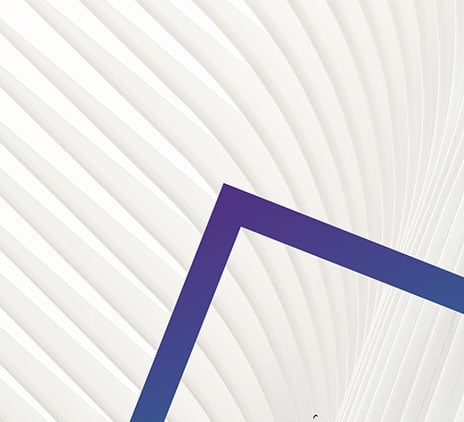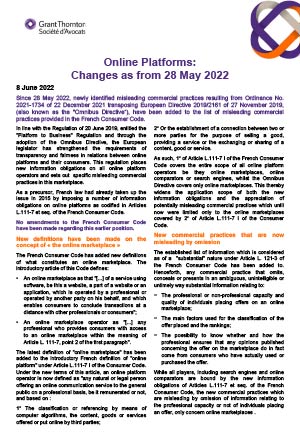-
Pilotage de la politique fiscale
Pilotage de la politique fiscale
-
Gestion de la croissance
Gestion de la croissance
-
Contrôle et contentieux fiscal
Contrôle et contentieux fiscal

-
Définition d’une structuration stratégique et sécurisée des prix de transfert
Accompagnement à la définition d’une structuration stratégique et sécurisée des prix de transfert
-
Accompagnement au développement des activités à l’international et aux réorganisations opérationnelles « Business restructuring »
Accompagnement au développement des activités à l’international et aux réorganisations opérationnelles « Business restructuring »
-
Défense des pratiques dans le cadre des contrôles fiscaux et de leur suite
Assurer la défense des pratiques dans le cadre des contrôles fiscaux et de leur suite
-
Obligations déclaratives accrues et généralisées
Répondre aux obligations déclaratives accrues et généralisées

-
TVA domestique et internationale applicable à vos flux
TVA domestique et internationale applicable à vos flux
-
TVA bancaire et financière, TVA dans le secteur assurance
TVA bancaire et financière, TVA dans le secteur assurance
-
TVA immobilière et droits d’enregistrement (DE)
TVA immobilière et droits d’enregistrement (DE)
-
TVA dans le secteur public et associatif
TVA dans le secteur public et associatif
-
Contrôle fiscal, contentieux fiscal et relations avec l’Administration fiscale
Contrôle fiscal, contentieux fiscal et relations avec l’Administration fiscale
-
Règles applicables en matière de facturation
Règles applicables en matière de facturation
-
Problématiques douanières liées à vos flux internationaux
Problématiques douanières liées à vos flux internationaux
-
Obligations d’immatriculation à la TVA et obligations déclaratives
Obligations d’immatriculation à la TVA et obligations déclaratives (TVA, DEB, DES)
-
Taxe sur les salaires
Taxe sur les salaires
-
Autres taxes indirectes
Autres taxes indirectes

-
Le Diag Transmission
Nous vous aidons à anticiper et appréhender votre opération de transmission

-
Mise en place et structuration de votre stratégie de distribution
Mise en place et structuration de votre stratégie de distribution
-
Digitalisation des activités de distribution
Digitalisation des activités de distribution
-
Relations entre fournisseurs et distributeurs
Gérer vos relations avec vos fournisseurs et distributeurs
-
Mise en place et structuration de votre politique contractuelle
Mise en place et structuration de votre politique contractuelle
-
Contrôle et contentieux en matière de délais de paiement
Contrôle et contentieux en matière de délais de paiement
-
Organisation et sécurisation de vos relations commerciales avec les consommateurs
Organisation et sécurisation de vos relations commerciales avec les consommateurs
-
Droit des données personnelles - RGPD
Droit des données personnelles – conseil en RGPD
-
Baux commerciaux
Un accompagnement dans la gestion et le Contract Management des baux commerciaux.

-
Prestations traditionnelles
Prestations traditionnelles en droit social
-
Santé au travail et qualité de vie au travail
Assurer une plus grande souplesse dans l’organisation du temps de travail et améliorer la qualité de vie au travail
-
Audit du Management des Ressources Humaines
Auditer des prestations de service de la fonction RH au Groupe
-
Ingénierie RH & People Change
Mettre en place des réponses managériales en réponse aux enjeux stratégiques de l’entreprise
-
Gestion de la conformité RH et des enquêtes internes
Gestion de la conformité RH : harcèlement, discrimination et dénonciation…

-
Conseil dans la structuration juridique
Conseil dans la structuration juridique
-
Gestion courante des entreprises
Gestion courante des entreprises
-
Réorganisation d’entreprises
Réorganisation d’entreprises
-
Cession et acquisition d’entreprises
Cession et acquisition d’entreprises
-
Evolution de l’actionnariat – Emission de valeurs mobilières
Evolution de l’actionnariat – Emission de valeurs mobilières
-
Gouvernance et maîtrise des risques juridiques
Gouvernance et maîtrise des risques juridiques

-
Développement d’une politique de mobilité internationale
Développement d’une politique de mobilité internationale
-
Coordination des obligations déclaratives des salariés en situation de mobilité
Coordination des obligations déclaratives des salariés en situation de mobilité
-
Conseil en matière de sécurité sociale
Conseil en matière de sécurité sociale
-
Assistance en matière de droit du travail
Assistance en matière de droit du travail

-
La gestion et l'exploitation de vos portefeuilles de droits
Nous établissons avec nos clients la politique de protection de leurs droits de propriété intellectuelle la plus adaptée à leurs projets.
-
La sécurisation de vos projets : conseil et rédaction contractuelle
Conseil en matière de propriété intellectuelle, de droit de la publicité, politique contractuelle en matière de droit d’auteur et droit à l’image.
-
La défense de vos droits : précontentieux et contentieux
La défense de vos droits : détection des atteintes, précontentieux et contentieux

Since 28 May 2022, newly identified misleading commercial practices resulting from Ordinance No. 2021-1734 of 22 December 2021 transposing European Directive 2019/2161 of 27 November 2019, (also known as the “Omnibus Directive”), have been added to the list of misleading commercial practices provided in the French Consumer Code.
In line with the Regulation of 20 June 2019, entitled the “Platform to Business” Regulation and through the adoption of the Omnibus Directive, the European legislator has strengthened the requirements of transparency and fairness in relations between online platforms and their consumers. This regulation places new information obligations on all online platform operators and sets out specific misleading commercial practices in this marketplace.
As a precursor, French law had already taken up the issue in 2015 by imposing a number of information obligations on online platforms as codified in Articles L.111-7 et seq. of the French Consumer Code.
No amendments to the French Consumer Code have been made regarding this earlier position.
New definitions have been made on the concept of « the online marketplace »
The French Consumer Code has added new definitions of what constitutes an online marketplace. The introductory article of this Code defines:
- An online marketplace as that “[...] of a service using software, be this a website, a part of a website or an application, which is operated by a professional or operated by another party on his behalf, and which enables consumers to conclude transactions at a distance with other professionals or consumers”;
- An online marketplace operator as “[...] any professional who provides consumers with access to an online marketplace within the meaning of Article L. 111-7, point 2 of the first paragraph”.
The latest definition of “online marketplace” has been added to the introductory French definition of “online platform” under Article L.111-7 I of the Consumer Code. Under the new terms of this article, an online platform operator is now defined as “any natural or legal person offering an online communication service to the general public on a professional basis, be it remunerated or not, and based on :
1° The classification or referencing by means of computer algorithms, the content, goods or services offered or put online by third parties;
2° Or the establishment of a connection between two or more parties for the purpose of selling a good, providing a service or the exchanging or sharing of a content, good or service.”
As such, 1° of Article L.111-7 I of the French Consumer Code covers the entire scope of all online platform operators be they online marketplaces, online comparators or search engines, whilst the Omnibus Directive covers only online marketplaces. This thereby widens the application scope of both the new information obligations and the appreciation of potentially misleading commercial practices which until now were limited only to the online marketplaces covered by 2° of Article L.111-7 I of the Consumer Code.
To read the rest of this Insight, please download the PDF below.
















